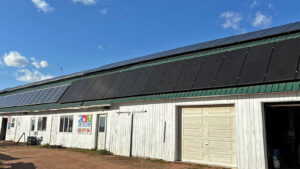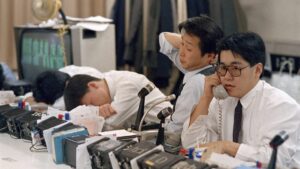“I had the hormonal urges,” said Prof Camille Parmesan, a leading climate scientist in France. “Oh my god, it was very strong. But it was, ‘Do I really want to bring a child into this world that we’re creating?’ Even 30 years ago it was very clear that the world was going to hell in a hand basket. I’m 62 now and I’m actually very glad I didn’t have children.”
Parmesan is not alone. An exclusive Guardian survey found that nearly a fifth of female climate scientists who responded chose to have no children, or fewer children, because of the environmental crises plaguing the world.
Such decisions were extremely difficult, they said. Dr Shobha Maharaj, an expert on the effects of the climate crisis from Trinidad and Tobago, chose to have only one child, a boy who is now six years old. “Choosing to have a child was and continues to be a struggle,” she said.
Maharaj said fear of what her child’s future would hold, as well as adding another human to the planet, was part of the struggle: “When you grow up on a small island, it becomes part of you. Small islands are already very adversely affected, so there is this constant sense of impending loss and I just didn’t want to have to pass that on to my child.”
“However, my husband is the most family-oriented person I know,” Maharaj said. “So it was a compromise: one child, no more. Who knows, maybe my son will grow up to be someone who can help find a solution?”
The Guardian approached every contactable lead author or review editor of all Intergovernmental Panel on Climate Change reports since 2018. The IPCC’s reports are the gold standard of climate knowledge. Of the 843 contacted, 360 answered the question about life decisions, a high response rate.
Ninety-seven female scientists responded, with 17 including women from Brazil, Chile, Germany, India and Kenya saying they had chosen to have fewer children. All but 1% of the scientists surveyed were over 40 years of age and two-thirds were over 50, reflecting the senior positions they had reached in their professions. A quarter of the respondents were women, the same proportion as the overall authorship of the IPCC reports.
The findings were in response to a question about important personal decisions made in response to the climate crisis by scientists who know most about it, and who expect global temperatures to rise beyond international targets in the coming years. 7% of the male scientists who responded said they either had no children or fewer than they otherwise would have had.
Most of the women scientists interviewed made their decisions about children in recent decades, when they were younger and the serious danger of global warming was less apparent. They said they did not want to add to the global human population taking a heavy environmental toll on the planet, and some also expressed fears about the climate chaos a child might now have to live through.
The role of increasing world population in the destruction of nature and the climate crisis has been a divisive topic for decades. The publication of The Population Bomb by Prof Paul Ehrlich in 1968, mentioned by several of the scientists in their survey responses, was a particular flash point. The debate has sparked earlier allegations of racism, as nations with rapidly rising populations are largely those in Africa and Asia. Mandatory population control is not part of today’s population-environment debate, with better educational opportunities for girls and access to contraception for women wanting it to be seen as effective and humane policy.
Parmesan, at the CNRS Ecology Center in France, said: “When I made my choice, it was very clear in the ecological community that human population growth was a problem: the preservation of biodiversity was absolutely dependent on the stabilization of the population .”
Prof Regina Rodrigues, an oceanographer at the Federal University of Santa Catarina in Brazil, who also chose not to have children, was influenced by the environmental destruction she saw in the fast-growing coastal town near São Paulo where she grew up.
“The fact of the limitation of resources was very clear to me from an early age,” she said. “Then I learned about climate change and it was even more clear to me. I’m perfectly content to teach and pass on what I know to people – it doesn’t have to be my blood. [My husband and I] don’t regret a moment. We both work on climate and we fight.”
to newsletter promotion
Prof Lisa Schipper, an expert on climate vulnerability at the University of Bonn in Germany, chose to have one child. She said that coming from the global north, where each person’s carbon footprint is much larger than those living in the global south, there is a responsibility to think carefully about this choice.
“It’s honestly only now that I’m starting to panic about my child’s future,” she said. “When she was born in 2013, I felt more optimistic about the possibility of reducing emissions. Now I feel guilty for leaving her in this world without my protection, and guilty for playing a role in the changing climate. So it’s dark.”
An Indian scientist who chose to remain anonymous decided to adopt rather than have children of her own. “There are too many children in India who don’t get a fair chance and we can offer that to someone who has already been born,” she said. “We are not so special that our genes must be passed on: values matter more.”
She said wealthy people who choose to have large families are “self-centered and irresponsible in the present times”, citing low child mortality and the large gap between the exclusion of the rich and the poor.
The relationship between environmental concerns and fertility choices is complex and research to date has been lacking found little consistency across age groups and nationalities. According to a recent review, the choice to have fewer or no children for environmental reasons can be the result of fears about the future, population levels or not the resources needed to raise the children.
A study of Americans aged 27 to 45 – younger than the IPCC scientists surveyed – found concerns about the well-being of children in a climate-changed world to be a far greater factor than concerns about the carbon footprint of their offspring. However, a focus group study in Sweden across all ages found that few had changed or would change their plans for children because of climate fears.
There has been almost no research in the global south. Many researchers have noted that some women do not have the freedom or ability to choose whether or how many children they have.
On the debate over the role of population growth in environmental crises, Schipper said: “How many people we have is irrelevant if only a small percentage is doing most of the damage.” Parmesan disagreed, saying the total impact is the combination of people’s level of consumption and the total number of people: “Don’t pick half of the equation and ignore the other half.”






